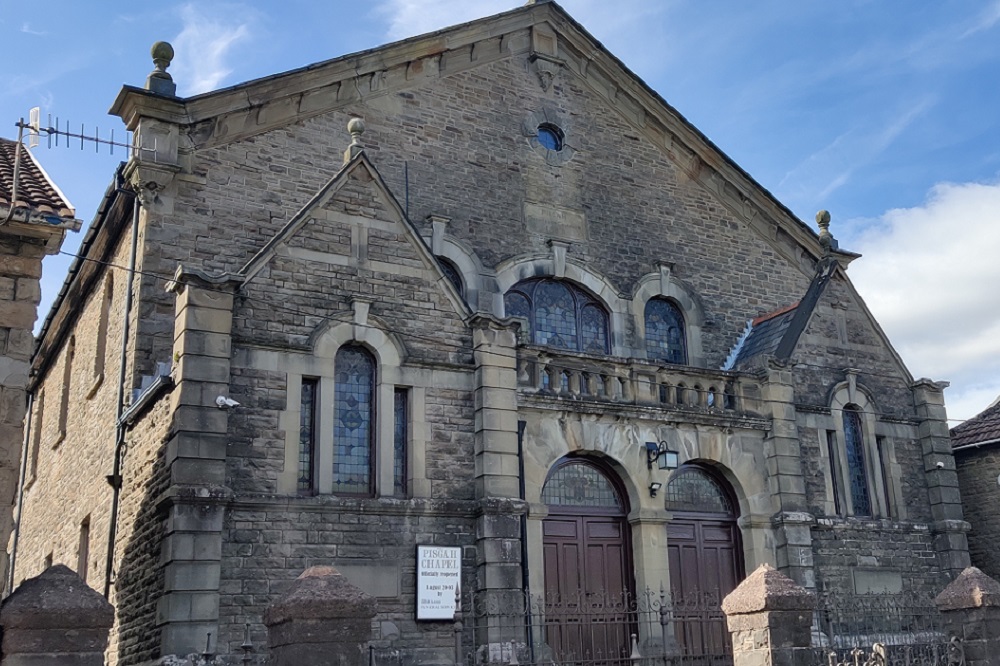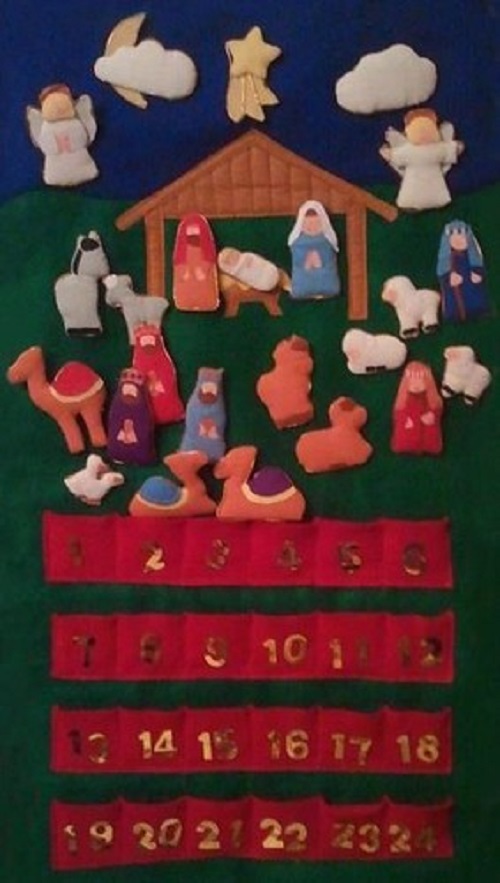Chapel, Sunday School and the Flannelgraph

Continuing our series by John Geraint, author of ‘The Great Welsh Auntie Novel’, and one of Wales’s most experienced documentary-makers. ‘John On The Rhondda’ is based on John Geraint’s popular Rhondda Radio talks and podcasts.
John Geraint
Is your family Chapel or Pub? It’s not a question that means so much anymore, but when I was growing up in the Rhondda, it was the Great Divide.
Whether it was the chapel or the pub which you frequented mattered like… well, I almost said ‘hell’, but you know what I mean.
Chapel deacons frowned on any good Christian who entered licensed premises; and those who enjoyed the convivial atmosphere of a pub or club were rarely if ever seen in the pews of Bethel or Jerusalem, Soar or Saron.
So it was Chapel or Pub. If you went to one, it was odds-on you never darkened the door of the other.
My family were Chapel. My Mam and Dad – lifelong teetotallers – were probably well into their fifties before they ever went into a pub, and then it was only if they were on their travels and there was nowhere else to get a square meal.
But we’re talking about the 1970s now, and pub lunches were just becoming a thing. Before then, you have never dreamt of entering into a Public House for food, and Mam and Dad certainly wouldn’t countenance going there for a drink.
Chapel, chapel, chapel
No, when I was a boy it was Chapel – Chapel, Chapel, Chapel, three times on a Sunday, two full services and Sunday School sandwiched between them in the afternoon.
Sunday School! At half-past two every Sunday, us small children would be led through the creaking door at the front of Bethel chapel, down the dizzying steep wooden steps to the Vestry, a kind of cavernous under-Hall.
Deep in the bowels of the earth, the Vestry was heated only by a couple of gas fires mounted high on the walls, and those walls were filmed with damp and condensation. It was clammy on the hottest summer’s day and freezing in the depths of winter.
All the same, the Vestry was a cavern of delight. It was here that Auntie Katie would tell us the most amazing stories – stories illustrated by flannelgraph, a primitive form of animation using felt cut-outs of Bible characters which Auntie Katie would press onto an upright easel and board covered with green baize.
Noah and his Ark, and three or four token pairs of flannelgraph animals hung there precariously whilst the rain descended and the floods came and washed everything else away, Auntie Katie said. Then, the rain stopped and triumphantly, she’d produce a dazzling rainbow, and position it right above Noah’s big boat, an arc above the Ark, if you see what I mean.
Auntie Katie was ancient, by the way. She probably knew Ham, Shem and Japheth personally.
Jam sandwiches and cracknels
Other Bible stories had special songs, ‘choruses’ they were called, to explain them and make them memorable. How did Moses cross the Red Sea?
“God blew with His wind, puff, puff, puff, puff; He blew just enough, ’nough, ’nough, ’nough, ’nough” – and the waters parted miraculously.
How did the boy called David defeat the giant Philistine, Goliath, armed with nothing but a sling?
“Only a boy called David, only a babbling brook. Only a boy called David, five little stones he took. One little stone went into the sling, And the sling went round and round. Round and round, And round and round, And round and round and round. One little stone went up in the air, And the giant came tumbling down!”
See, it works! I can still picture it all.
Best of all, of course, were the songs and stories about Jesus, who wanted me for a Sunbeam, so I had to shine out, sh-sh-sh-shine for Him.
In one of my favourite stories, a rich man named Zacchaeus wanted to get a look who this Jesus was, as He was passing by one day. Zacchaeus was very rich – but very short, no taller than us nippers. He couldn’t see over heads of the crowd. So he climbed up a tree to get a better view, and that’s where Jesus spotted him.
And not only spotted him, according to the chorus we sang, but shouted up, “Zacchaeus, you come down, For I’m coming to your house for tea.”
I loved that. After Sunday School, I would be on my way to my Nanna’s house for tea, so I could imagine Jesus and Zacchaeus sitting down to jam sandwiches and cracknels, just like us; and after that they’d have tinned peaches and ideal milk and a glass of Dandelion and Burdock – that was bound to be Jesus’s favourite flavour, too, I was sure of that.
Perhaps He and Zacchaeus even watched Lost In Space, if they were allowed to watch TV on Sunday, which I wasn’t in my own house, but my indulgent Nanna let me do.
There was a more serious, grown-up point to the Biblical story – Zaccheus was a corrupt tax-collector, a collaborator with the Romans who’d conquered Israel. Respectable Jews wouldn’t have sullied themselves by going to his house; Jesus did, and the upshot was Zacchaeus promised to give half of his fortune to the poor, and repay everyone he’d cheated four times over.
I didn’t get as far as understanding any of that back then; in fact, I probably mixed Zacchaeus up with Dr Zachary Smith, the miserable baddie in Lost In Space, who was also in need of redemption.
Seeking asylum
Back in Sunday School, in the run-up to Christmas, Auntie Katie showed us how the baby Jesus was born.
There was the Stable, and the Manger, and the Star and the flannelgraph Mary and Joseph, and the flannelgraph Shepherds and the flannelgraph Angels, all just about hanging on to the green baize, and the little Lord Jesus laying down His sweet head, and also in mortal danger of dropping off, as it were.
Thank goodness the Wise Men turned up in time on their Camels with his Christmas presents.
But – as with Zacchaeus – there was another side to the Christmas story, one quite different from the comforting and sentimental version we sang about in Away In a Manger, one that was kept from us in our early years in Sunday School, or downplayed at any rate.
Mary and Joseph, you see, were effectively homeless when Jesus was born, and then, because King Herod became paranoid and murderous when he heard the Wise Men’s prophecy about a new king being born, they had to flee into Egypt.
Yes, that’s right, they were migrants, seeking asylum in a foreign land, dependent on the welcome they found amongst strangers.
It’s worth thinking about, isn’t it? How different the whole story might have been if Mary and Joseph hadn’t found a safe haven to raise their infant son.

Sacrosanct
For most of us these days, Christmas is a family time, and despite the way it’s been commercialised, it remains precious because of that.
During the pandemic, certain politicians did almost anything to avoid being seen to be ‘stealing’ or ‘cancelling’ Christmas – especially, it turns out, if they themselves had been party to parties when others had been in lockdown.
Indeed, Christmas has become almost sacrosanct, in a way that I’m sure is surprising to those who’ve been observing it faithfully in the old-fashioned Chapel way year after year.
Chapels play a much less prominent part in Rhondda life, in Welsh life, by now.
Ebenezer and Pisgah, Bethania and Penuel, Hermon and Horeb, Noddfa and Calfaria and Moriah – they’re names that don’t trip easily off the tongue anymore.
Many Chapel buildings have been demolished, others adapted for new purposes, quite different to their original use.
But as we prepare for the Season of Goodwill and Joy to all, and whether you’re raising a glass, or raising a prayer, or doing both, spare a thought for Auntie Katie and her flannelgraph, for all the lessons we learned when we were small, and for all the ones we still have to learn, however old we are.
‘John On The Rhondda’ is broadcast at about 3.15pm as part of David Arthur’s Wednesday Afternoon Show on Rhondda Radio
All episodes of the ‘John On The Rhondda’ podcast are available here
John Geraint’s debut in fiction, ‘The Great Welsh Auntie Novel’, is available from all good bookshops, or directly from Cambria Books
Support our Nation today
For the price of a cup of coffee a month you can help us create an independent, not-for-profit, national news service for the people of Wales, by the people of Wales.






Diolch yn fawr! Such an evocative piece bringing back many memories and then linking to our current situation here in the UK today. I wonde how many of those in government who call themselves Christian recognise this aspect of the Christmas story?!
Rwy’n cofio’r cyfan yn Lloegr